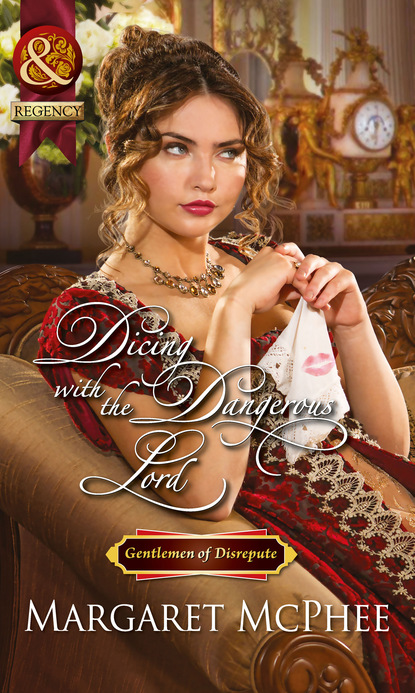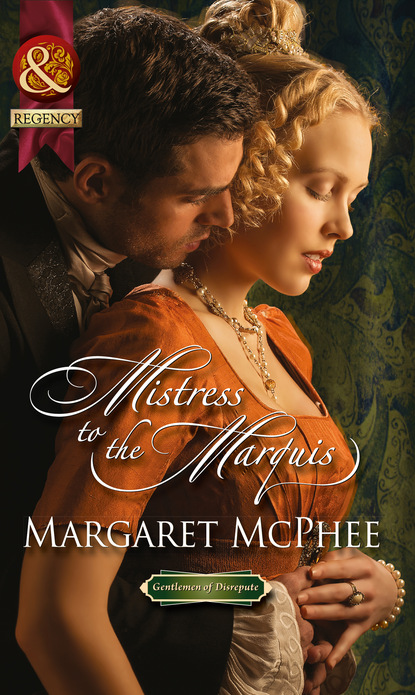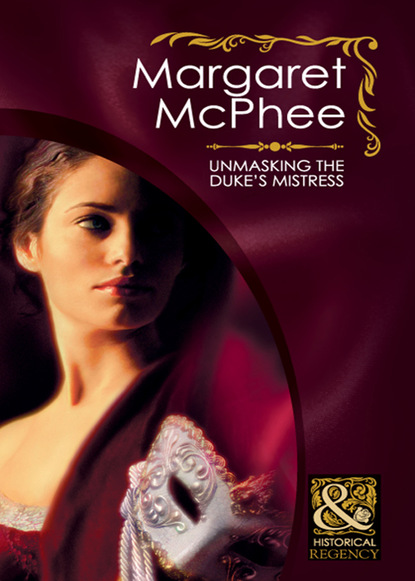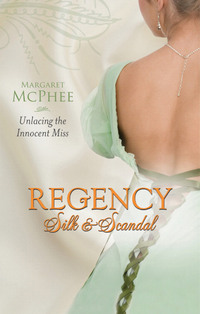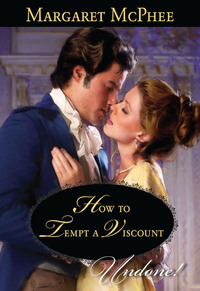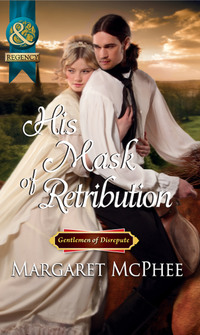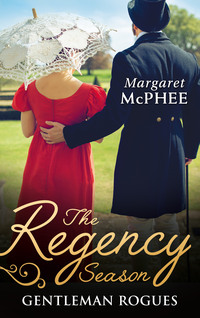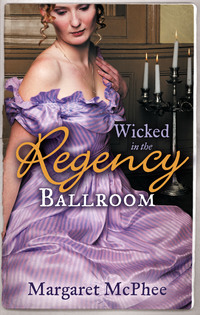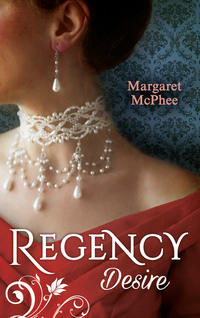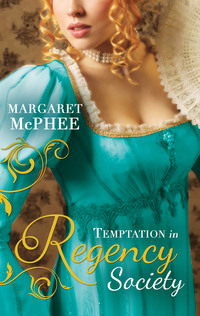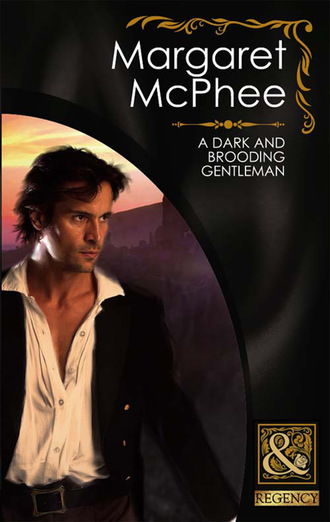
Полная версия
A Dark And Brooding Gentleman
The man recovered too quickly and she heard his booted footsteps chasing after her. Phoebe ran for all she was worth, her heart thudding fast and furious, her lungs panting fit to burst. She kept on running, but the highwayman was too fast. She barely made it a hundred yards before he caught her.
‘Whoa, lassie. No’ so fast. You and I havenae yet finished our business.’
‘Unhand me, you villain!’
‘Villain, am I?’ With rough hands he pulled her into his arms and lowered the stench of his mouth towards hers.
Phoebe hit out and screamed.
A horse’s hooves sounded then. Galloping fast, coming closer.
Her gaze shot round towards the noise, as did the highway man’s.
There, galloping down the same hill she had not long walked, was a huge black horse and its dark-clad rider—rather incongruous with the rest of the sunlit surroundings. He was moving so fast that the tails of his coat flew out behind him and he looked, for all the world, like some devil rider.
Black Kerchief’s hand was firm around her wrist as he towed her quickly back to where his accomplice still stood waiting. And she saw that he, too, had pulled down his mask so that it now looked like a loose ill-fitting neckerchief. Jim grabbed her and used one hand to hold her wrists in a vice-like grip behind her back. She felt the jab of something sharp press against her side.
‘One sound from you, lady, and the knife goes in. Got it?’
She gave a nod and watched as Black Kerchief stood between her and the road, so that she would be obscured from the rider’s view as he sped past.
Please! Phoebe prayed. Please, she hoped with every last ounce of her will.
And it seemed that someone was listening for the horseman slowed as he approached and drew the huge stallion to a halt by their small group. Not the devil after all, but a rich gentleman clad all in black.
‘Step away from the woman and be on your way.’ Hunter spoke quietly enough, but in a tone that the men would not ignore if they had any kind of sense about them.
‘She’s my wife. Been givin’ me some trouble, she has,’ the taller of the men said.
Hunter’s gaze moved from the woman’s bonnet crushed on the grass by the men’s feet, to the neckerchiefs around the men’s collars, and finally to the woman herself. Her hair glowed a deep tawny red in the sunshine and was escaping its pins to spill over her shoulders. She was young and pretty enough with an air about her that proclaimed her gentle breeding, a class apart from the men who were holding her, and she was staring at him, those fine golden-brown eyes frantically trying to convey her need for help. He slipped down from the saddle.
‘She is no more your wife than mine. So, as I said, step away from her and be on your way … gentlemen.’ He saw the men glance at each other, communicating what they thought was a silent message.
‘If you insist, sir,’ the taller villain said and dragged the girl from behind him and flung her towards Hunter at the same time as reaching for his pistol.
Hunter thrust the girl behind him and knocked the weapon from the highwayman’s hand. He landed one hard punch to the man’s face, and then another, the force of it sending the man staggering back before the villain slumped to his knees. Hunter saw the glint of the knife as it flew through the air. With the back of his hand he deflected its flight, as if he were swatting a fly, and heard the clatter of the blade on the empty road.
The accomplice drove at him, fists flying. Hunter stepped forwards to meet the man and barely felt the fist that landed against his cheekbone. The ineffective punch did nothing to interrupt Hunter’s own, which was delivered with such force that, despite the villain’s momentum, the man was lifted clear off his feet and driven backwards to land flat on his back. The shock of the impact was felt not only by the accomplice, who was out cold upon the ground, but seemed to reverberate around them. The taller highwayman, who had been trying to pick himself up following Hunter’s first blow, stopped still and, as Hunter turned to him, all aggression evaporated from the scoundrel.
‘Please, sir, we were only having a laugh.’ It was almost a whimper. ‘We wouldnae have hurt the lassie; look, here’s her purse.’ The highwayman fished the woman’s purse from his pocket and offered it as if in supplication.
‘Throw it,’ Hunter instructed.
The man did as he was told and Hunter caught it easily in one hand before turning to the woman.
She was white-faced and wary, but calm enough for all her fear. In her hand she gripped the highwayman’s knife as if she trusted him as little as the villains rolling and disabled on the ground before him.
Hunter’s expression was still hard, but he let the promise of lethality fade from his eyes as he looked at her.
He held the purse aloft. ‘Yours, I take it?’
She seemed to relax a little and gave an answering nod of her head. The man must have taken it from her pocket while they were struggling.
He threw the purse to her and watched her catch it, then barked an order for the highwayman, who was leaning dazed upon the stile, to pack the jumble of women’s clothing lying in a heap at the side of the road into the discarded travelling bag. Only when the filled and fastened bag was placed carefully at his feet did Hunter move.
‘To where are you walking?’ His voice was curt and he could feel the woman’s stare on him as he swung himself up into the saddle.
She glanced over at the highwaymen and then back at Hunter.
‘Kingswell Inn.’ A gentlewoman’s voice sure enough. The pure clarity of it stirred sensations in Hunter that he thought he had forgotten.
He urged Ajax forwards a few steps and reached his hand down for her.
She hesitated and bit at her lower lip as if she were uncertain.
‘Make up your mind, miss. Do I deliver you to Kingswell, or leave you here?’ Hunter knew his tone was cold, but he did not care.
She took his hand.
‘Place your foot on the stirrup to gain purchase,’ he directed and pulled her up. As he settled her to sit sideways on the saddle before him the woman glanced up directly into his eyes. The attraction that arced between them was instant, its force enough to make him catch his breath. The shock of it hit him hard. For one second and then another they stared at each other, and then he deliberately turned his face away, crushing the sensation in its inception. Such feelings belonged to a life that was no longer his. He did not look at her again, just pressed the travelling bag into her hands and nudged Ajax to a trot.
‘Did they hurt you?’ The chill had thawed only a little from his voice.
Phoebe stared and her heart was beating too fast. ‘I am quite unhurt, thank you, sir. Although it seems you are not.’ She smiled to hide her nervousness. Clutching her bag all the tighter with one hand, she found her handkerchief with the other and offered it to him.
His frown did little to detract from the cold handsomeness of his face, but it did make it easier for Phoebe to ignore the butterflies’ frantic fluttering in her stomach and the rush of blood pounding through her veins. The bright morning sunlight cast a blue hue in the ebony of his hair and illuminated the porcelain of his skin. Dark brows slashed bold over eyes of clear pale emerald. Such stark beautiful colouring upon a face as cleanly sculpted as that of the statues of Greek gods in her papa’s books. A square chiselled jaw line and cleft chin led up to well-defined purposeful lips. His nose was strong and masculine, his cheekbones high, the left one of which was sporting a small cut that was bleeding. Phoebe could feel the very air of darkness and danger emanating from him and yet still she felt she wanted to stare at him and never look away. She ignored the urge.
‘You have a little blood upon your cheek.’
He took the handkerchief without a word, wiped the trickle of blood and stuffed the handkerchief into his own pocket.
She could feel the gentleman’s arm around her waist anchoring her onto the saddle, and was too conscious of how close his body was to hers even though he had taken care to slide back in the saddle to leave some room between them. He might not care for manners, but Phoebe’s papa had raised her well.
‘Thank you for your intervention, sir.’ She was pleased to hear that her voice was a deal calmer than she felt.
The pale eyes slid momentarily to hers and she saw that they were serious and appraising. He gave a small inclination of his head as acknowledgement of her gratitude, but he did not smile.
‘They meant to rob me and steal a kiss.’
‘That is not all they would have stolen.’ She could almost feel the resonance of his voice within his chest so close was she to it, deep and rich and yet with that same coolness in it that had been there from the very start.
She looked up into those piercing eyes, not quite certain if his meaning was as she thought. She was so close she could see the iris, as pale and clear a green as that of glass, edged with solid black. She could see every individual dark lash and the dark wings of his brows. The breath seemed to lodge in her throat.
‘If you have no mind to lose it, then you will not travel this road alone again.’ He looked at her meaningfully and then he gee’d the horse to a canter, and there was no more talk.
As the horse gathered speed she gripped the pommel with her left hand, and held her bag in place with her right. The man’s arm tightened around her and their bodies slid together so that Phoebe’s right breast was hard against his chest, her right hip tight against his thigh, his hand holding firm upon her waist. Her heart was thudding too hard, her blood surging all the more and not because of the speed at which the great black horse was thundering along the road. It seemed that the man engulfed her senses, completely, utterly, so that she could not think straight. The time seemed to stretch for ever in a torture of wanton sensations.
He did not stop until they reached the coaching inn.
The high moorland surrounded them now, bleak and barren and vast, stretching into the distance as far as the eye could see. The breeze was stronger here, the birds quieter, the air that bit cooler.
And when he lowered her gently to the ground and she looked up at him to thank him again, the words died on her lips, for he was staring down at her with such intensity she could not look away. All time seemed to stop in that moment and it was as if something passed between them, something Phoebe did not understand that shimmered through the whole of her body. Finally he broke his gaze and turned, urging the great horse out of the inn’s yard, out onto the road and, without a backward glance, galloped away across the moor.
Phoebe stood there with the dust caked thick upon her boots and the hem of her faded blue dress, the travelling bag in her hand, and she watched him until the dark figure upon his dark horse, so stark against the muted greens and purples and browns that surrounded him, faded against the horizon. And only then did she realise he had not asked her name nor told her his. She turned away and walked over to the small stone wall by the side of the inn and sat down in the shade to wait. The clock on the outside of the inn showed half past six.
Chapter Two
Out on the moor the land was washed with a warm orange hue from the setting sun. At Blackloch Hall Sebastian Hunter stood, sombre and unmoving, by the arched-latticework window of his study and stared out across the stretch of rugged moor. A cool breeze stirred the heavy dark-red curtains that framed the window and ruffled through his hair. The clock on the mantel chimed nine and then resumed its slow steady tick. He swirled the brandy in the crystal-cut glass and took a sip, revelling in the rich sweet taste and the heat it left as it washed over his tongue and down his throat. He was only half-listening as Jed McEwan, his friend and steward, sitting in the chair on the opposite side of the desk, covered each point on his agenda. Rather, Hunter was thinking over the day, of Bullford and Linwood’s appearance in Glasgow, and more so over the happenings upon the road—of the highwaymen and the woman. Inside his pocket his fingers touched the small white-lace handkerchief.
‘And finally, in less than a fortnight, it is the annual staff trip to the seaside. Do you plan to attend, Hunter?’ The inflection at the end of McEwan’s voice alerted him to the question.
‘I do.’ It was a tradition passed down through generations of the Hunter family, and Hunter would keep to it regardless of how little he wanted to go.
‘We have covered every item on the list.’
Hunter moved to top up McEwan’s brandy glass, but McEwan put a hand over it and declined with thanks.
‘Mairi been giving you a hard time?’ Hunter asked as he filled his own glass.
‘No, but I should be getting back to her.’ McEwan smiled at the thought and Hunter felt a small stab of jealousy at his friend’s happiness. The darkness that sat upon his soul had long since smothered any such tender feelings in Hunter. ‘My father is arriving tonight.’
Hunter felt the muscle flicker in his jaw. He turned away so that McEwan would not see it.
But McEwan knew. And Hunter knew that he knew.
Through the open window, over the whisper of the wind and the rustle of the heather from the moor, came the faint rumble of distant carriage wheels.
Hunter raised an eyebrow and moved to stand at the window once more. He stared out over the moor, eyes scanning the narrow winding moor road that led only to one place—all the way up to Blackloch. ‘Who the hell …?’ And he thought of Bullford and Linwood again.
‘Sorry, Hunter. I meant to tell you earlier, but I got waylaid with other things and then it slipped my mind.’ McEwan picked up his pile of papers and came to stand by Hunter’s side. ‘That will be your mother’s companion, a Miss Phoebe Allardyce. Mrs Hunter sent Jamie with the gig to Kingswell to meet the woman from the last coach.’
Hunter frowned. He did not know that his mother had a companion. He did not know anything of his mother’s life in Glasgow, nor why she had suddenly arrived back at Blackloch yesterday, especially not after the way they had parted.
Hunter watched the small dark speck of the gig grow gradually larger and he wondered fleetingly what the woman would be like—young or old, plain or pretty? To the old Sebastian Hunter it would have mattered. But to the man that stood there now, so still and sullen, it did not. What did he care who she was, what she did? Hunter glanced at McEwan.
‘My mother’s companion is of no interest to me.’ He felt only relief that it was not Bullford or any other of his old crowd. And gladder still it was not Linwood.
McEwan made no comment. He turned away from the window and its view. ‘I will see you in the morning, Hunter.’
‘That is Blackloch Hall, over there, ma’am,’ said the young footman driving the gig and pointed ahead. ‘And to the left hand side, down from the house, is the Black Loch itself, Mr Hunter’s private loch, for which the house and the moor are named.’
Phoebe peered in the direction the boy was pointing. Across the barren moorland a solitary building stood proud and lonely, sinister in its bearing, a black silhouette against the red fire of the setting sun. And beyond it, the dark waters of the loch. The gig rounded the bend and the narrow track that had been winding up to this point straightened to become an avenue of approach to the house. At the front there was nothing to differentiate where the moor stopped and the house’s boundary began. No wall, no hedging, no garden. The avenue led directly up to the house. With every turn of the gig’s wheels Phoebe could see Blackloch Hall loom closer.
It was a large foreboding manor house made to look like a castle by virtue of its turrets and spires. As they drew nearer Phoebe saw the rugged black stonework transform to a bleak grey. All the windows were in darkness; not the flicker of a single candle showed. All was dark and still. All was quiet. It looked as if the house had been deserted. The great iron-studded mahogany front door, beneath its pointed stone arch of strange carved symbols, remained firmly closed. As the gig passed, she saw the door’s cast-iron knocker shaped like a great, snarling wolf’s head and she felt the trip of her heart. The gig drove on, round the side of the house and through a tall arched gateway, taking her round into a stable yard at the back of the house.
The young footman jumped down from the gig’s seat and came round to assist her before fetching her bag from the gig’s shelf.
‘Thank you.’ Phoebe’s eyes flicked over the dismal dark walls of Blackloch Hall and shivered. It was like something out of one of Mrs Hunter’s romance novels, all gothic and dark and menacing. Little wonder the lady had chosen to make her home in Glasgow.
The boy shot a glance at her as if he was expecting her to say something.
‘What a very striking building,’ she managed.
The boy, Jamie he said his name was, gave a nod and then, carrying her bag, led on.
Taking a deep breath, Phoebe followed Jamie towards the back door of the house. He no longer spoke and all around was silence, broken only by the crunch of their shoes against the gravel.
From high on the roof the caw of a solitary crow sounded, and from the corner of her eye she saw the flutter of dark wings … and she thought of the man against whom her father had warned her—Sebastian Hunter. A shiver rippled down her spine as she stepped across the threshold into Blackloch Hall.
Phoebe did not see Mrs Hunter until late the next morning in the drawing room, which to Phoebe’s eye looked less like a drawing room and more like the medieval hall of an ancient castle.
Suspended from the centre of the ceiling was a huge circular black-iron chandelier. She could smell the sweetness of the honey-coloured beeswax candles that studded its circumference. The rough-hewn walls were covered with faded dull tapestries depicting hunting scenes and the floor of grey stone flags was devoid of a single carpet rug. A massive medieval-style fireplace was positioned in the centre of the wall to her left, complete with worn embroidered lum seats. A fire had been laid upon the hearth, but had not been lit so that, even though it was the height of summer, the room had a distinct chill to it. The three large lead-latticed windows that spanned the wall opposite the fireplace showed a fine view over the moor outside.
The furniture seemed a hodgepodge of styles: a pair of Italian-styled giltwood stools, a plainly fashioned but practical rotating square bookcase, a huge gilded eagle perched upon the floor beside the door, its great wings supporting a table top of grey-and-white marble, a small card table with the austere neoclassical lines of Sheraton, and on its surface a chessboard with its intricately carved pieces of ebony and ivory. Farther along the room was a long dark-green sofa and on either side of the sofa was a matching armchair and, behind them, in the corner, a suit of armour.
Mrs Hunter was ensconced on the sofa, supervising the making of the pot of tea. She watched while Phoebe added milk and a lump of sugar to the two fine bone-china cups and poured.
‘How was your father, Phoebe? Does he fare any better?’
‘A little,’ said Phoebe, feeling the hand of guilt heavy upon her shoulder.
‘That at least is something.’ The lady smiled and took the cup and saucer that Phoebe offered. ‘And you attended to all of my matters before your visit to the hospital?’
‘Yes, ma’am. Everything is in order. Mrs Montgomery will send your invitation to Blackloch Hall rather than Charlotte Street. I delivered the sample books back to Messrs Hudson and Collier and to Mrs Murtrie. As you suspected Mr Lyle did not have your shoes ready, but he says they will be done by the end of the week.’
‘Very well.’
Phoebe continued. ‘I collected your powders from Dr Watt and have informed all of the names on your list that you will be visiting Blackloch Hall for the next month and may be contacted here. And the letters and parcel I left with the receiving office.’
‘Good.’ Mrs Hunter gave a nod. ‘And how was the journey down?’
‘Fine, thank you,’ she lied and focused her attention to stirring the sugar into her tea most vigorously so that she would not have to look at her employer.
‘The coach was not too crowded?’
‘Not at all. I was most fortunate.’ A vision of the highwaymen and of a dark and handsome man with eyes the colour of emerald ice chips swam into her head. The teaspoon overbalanced from her saucer and dropped to the flagstones below where it bounced and disappeared out of sight beneath her chair. Phoebe set her cup and saucer down on the table and knelt to retrieve the spoon.
‘I would have sent John with the coach, but I do not wish to be at Blackloch without my own carriage at my dispos—’ Mrs Hunter broke off as the drawing-room door opened and the movement of footsteps sounded. ‘Sebastian, my, but you honour me.’ To Phoebe’s surprise the lady’s tone was acidic.
Phoebe felt a ripple of foreboding down her spine. She reached quickly for the teaspoon.
‘Mother, forgive my absence yesterday. I was delayed by matters in Glasgow.’ The man’s voice was deep and cool as spring water … and disturbingly familiar.
Phoebe stilled, her fingers gripping the spoon’s handle for dear life. Her heart was thudding too fast.
It could not be.
It was not possible.
Slowly she got to her feet and turned to face the wicked Mr Hunter. And there, standing only a few feet away across the room, was her dark handsome rescuer from the moor road.
Hunter stared at the young auburn-haired woman he had left standing alone at the Kingswell Inn. Her cheeks had paled. Her lips had parted. Her warm tawny eyes stared wide. She looked every inch as shocked as he felt.
He moved to his mother and touched his lips to her cool cheek. She suffered it as if he were a leper, shuddering slightly with distaste. So, nothing had changed after all. He wondered why the hell she was here at Blackloch.
‘Sebastian.’ His mother’s voice was cold, if polite for the sake of the woman’s presence. ‘This is my companion, Miss Allardyce. She came down on the late coach last night.’ Then to the woman, ‘Miss Allardyce, my son, Mr Hunter.’ He could hear the effort it took her to force the admission of their kinship.
‘Mr Hunter,’ the woman said in that same clear calm voice he would have recognised anywhere, and made her curtsy, yet he saw the small flare of concern in her eyes before she hid it.
‘Miss Allardyce.’ He inclined his head ever so slightly in the woman’s direction, and understood her worry given that it was now obvious she had palmed the money his mother had given her for her coach fare.
She was wearing the same blue dress, although every speck of dust looked to have been brushed from it. The colour highlighted the red burnish to her hair, now scraped and tightly pinned in a neat coil at the nape of her neck. His gaze lingered briefly on her face, on the small straight nose and those dewy dusky pink lips that made him want to wet his own. And he remembered the soft feel of her pressed against him on the saddle, and the clean rose-touched scent of her, and the shock of a desire he had thought quelled for good. She was temptation personified. And she was everything proper and correct that a lady’s companion should be as she resumed her seat and calmly waited for Hunter to spill her secret.
Not that Hunter had any intention of doing so. After her experience with the highwaymen he doubted she would make the same mistake again. He watched as she set the teaspoon she was holding down upon the tray and lifted her cup and saucer.
His mother’s tone was cool as she turned to her companion. ‘My son has not seen his mother in nine months, Miss Allardyce, and yet he cannot bring himself into my company. This is his first appearance since my arrival at Blackloch.’


